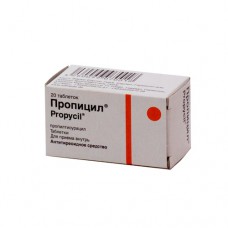Expiration date: 01/2026
The composition and form of issue:
Tablets. 1 tablet contains:
propylthiouracil 50 mg
excipients: lactose monohydrate maize starch silica colloidal anhydrous povidone starch jelatinizirovanny magnesium stearate
in vials of 20 PCs in a box 1 vial.
Description pharmaceutical form:
White round biconvex tablets with a break line.
Indications:
- thyrotoxicosis (diffuse toxic goiter, toxic thyroid adenoma)
- preparation for resection of the thyroid gland
- preparation for radioactive iodine treatment.
- In order to avoid complications can only be used after consultation with a doctor.
Contraindications:
- hypersensitivity
- leukopenia, agranulocytosis
- hypothyroidism
- active hepatitis, liver cirrhosis, liver dysfunction.
Application of pregnancy and breast-feeding:
How hyperthyroidism and hypothyroidism in pregnant women is associated with increased incidence of miscarriages, stillbirths and malformations.
The frequency of malformations in cases of treatment with Propecia not differ from the frequency of spontaneous malformations of the fetus.
Dose of Propecia should be as low as possible in order to avoid miscarriage and also the development of hypothyroidism and goitre in the foetus.
In the last three months of pregnancy often observed a spontaneous decrease in the severity of hyperthyroidism.
In pregnancy, the treatment is carried out under strict supervision (levels of thyroid hormones should be at the upper limit of normal, thyrotropin level should be below normal).
B breastfeeding Propycil is considered the drug of choice, because its concentration in breast milk is 1/10 of the level in the mother's serum. However, monitoring the newborn, because there are reports of some cases of hypothyroidism.
The combination of diffuse toxic goiter and pregnancy Propycil prescribed only monotherapy.
Side effects:
Agranulocytosis is a serious, but rare, side effect, accompanied by septic complications.
Sometimes marked skin rash, hives, stomach pain, arthralgia without signs of inflammation, the formation of goiter in a newborn in very rare cases (especially when using the drug in high doses) was observed following side effects: liver damage (Mechanochemistry necrosis, transient cholestasis), hypersensitivity reactions, drug fever, lymphadenopathy, and thrombocytopenia.
There are reports of individual cases of neuromuscular disorders, arthritis, volchanochnopodobny syndrome, periarteritis nodosa, gastrointestinal disorders (nausea, vomiting), dizziness, disorders of erythropoiesis, hemolysis, positive reaction Kumbsa, interstitial pneumonia, peripheral edema, and alopecia.
In the process of treatment Propecia may be enlargement of the thyroid gland.
Drug interactions:
If treatment Propecia carried out according to the scheme "block and replaced" in combination with thyroxine, the dose of Propecia needs to be increased.
Thyreostatics effect Propecia decreases in concurrent or previous use of iodine-containing medications or Radiocontrast substances.
B relation to the ability of substances to influence the effect of free active fractions of propranolol and coumarin derivatives requires additional correction doses of these drugs.
Method of application and dose:
Inside, without chewing, swallow whole, squeezed enough liquid every 6-8 hours.
At the beginning of treatment adults and children over 10 years: 75-100 mg (1.5 to 2 table.) a day. In severe cases and after prior loading with iodine, the initial daily dose was increased to 300-600 mg (6-12 table. distributed to 4-6 doses).
The maintenance dose is 25-150 mg (from 0.5 to 3 tabl.) a day.
Children aged 6 to 10 years receive at the beginning of treatment 50-150 mg (1 to 3 tabl.) a day, and when maintenance treatment is about 25-50 mg (0.5 to 1 table.) a day.
Thyrotoxicosis in neonates is prescribed 5-10 mg/kg/day (the daily dose distribute 3 admission). In the absence of response to treatment the recommended dose increase 1.5–2 times (75-100%).
The maintenance dose is 3-4 mg/kg/day.
According to existing data, patients with renal failure or on hemodialysis, there is no need to adjust the dose. In diseases of the liver the drug can be taken in the recommended doses, taking into account the relevant contraindications.
The duration of treatment is determined by individual patient need.
The experience of the therapeutic use of the drug Propycil shows that the duration of treatment of thyrotoxicosis with diffuse toxic goiter and toxic adenoma of the thyroid gland should be 1.5–2 years.
In preparation for surgery or radioactive iodine treatment duration of using the drug must meet the individual needs of the patient. Propycil can be used for the treatment of diffuse toxic goiter as a monotherapy, in the schema "block and replaced".
Overdose:
Cases of acute intoxication were observed. Chronic overdosing leads to development of goitre and hypothyroidism with symptoms dependent on the severity of hypothyroidism, due to the specific action of antithyroid drugs.
Treatment: special measures/events do not exist. Gastric lavage and endoscopic removal of tablets not effective due to rapid absorption of active substances. With the development of goiter and hypothyroidism, accompanied by symptoms correlating with the severity of hypothyroidism and resulting in chronic overdose, treatment with Propecia stop and expect spontaneous recovery of thyroid function. Replacement therapy with thyroxine is carried out in case if this is justified by the severity of hypothyroidism.
Precautions:
Agranulocytosis can develop within a few hours. Since in most cases the development of agranulocytosis cannot be predicted even with constant observation of the morphological blood picture, the patient must be informed about the symptoms of agranulocytosis (fever, malaise, tonsillar angina, stomatitis) and the need for immediate study of the blood picture.
During treatment, antitireoidne means necessary to control the functional state of the thyroid gland (identification of tireoidnykh hormones and/or tireotropina blood).
Treatment of too high doses of antithyroid drugs leads to the emergence or increase of an existing goiter. It should be borne in mind especially in the thoracic localization of goiter that is associated with the risk of compression of the anatomical structures in the mediastinum.
Special instructions:
Propycil is contraindicated in patients who have previously experienced severe side effects of the drug (agranulocytosis, severe liver damage).
The pathological changes in the numbers of formed elements of the blood and increase the transaminaz Propycil can be used only under strict medical supervision.
Influence on ability to driving and to the management of machines and mechanisms. Not affected.


